Buen Salud
Pepperdine Magazine is the feature magazine for Pepperdine University and its growing community of alumni, students, faculty, staff, and friends.
From air quality to water conservation, preserving Machu Picchu begins with the health of its neighbors.
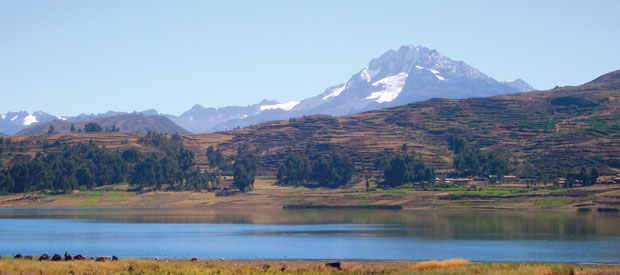
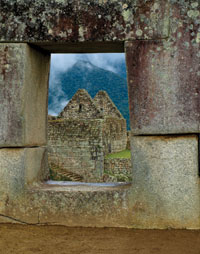 Residents of rural areas speak fondly of “the simple life.” They praise the bucolic
beauty of their homes, the connection they feel to the earth, and the deep sense of
community fostered among neighbors. Though not without challenges, it’s a far cry,
they say, from the rat race of modern, urban living—the gridlock traffic and neon
signs, the perpetual shadow from office buildings, and the feeling of isolation among
people who exist in such close proximity.
Residents of rural areas speak fondly of “the simple life.” They praise the bucolic
beauty of their homes, the connection they feel to the earth, and the deep sense of
community fostered among neighbors. Though not without challenges, it’s a far cry,
they say, from the rat race of modern, urban living—the gridlock traffic and neon
signs, the perpetual shadow from office buildings, and the feeling of isolation among
people who exist in such close proximity.
But School of Public Policy students Claudia Paredes (MPP ’09) and Josef Timchenko (MPP ’09) discovered a surprising commonality between these otherwise disparate ways of life when they traveled recently to the rural Urubamba Valley of Peru. The ancient sites of the Sacred Valley and Machu Picchu rest in fragile relation to the rural town of Urubamba, its surrounding villages, and the nearby city of Cuzco. Alarming pollution levels threaten the environment there, as well as the health and safety of residents. What’s more, local inhabitants often lack information on how they impact the natural resources around them.
“They’ll pour detergent in the river, they’ll bathe themselves or put their trash in the river—all without really realizing this is also the water they are consuming,” explains Paredes.
The pair worked with the nongovernmental organization (NGO) ProPeru, an offshoot of the service corps ProWorld, dedicated to promoting sustainable development in communities around the globe. Paredes helped educate local residents about how they interact with their environment, while Timchenko conducted research about improvements implemented by ProPeru, such as the Cleaner Burning Stove Project. This project swaps traditional stoves for properly ventilated bioovens to improve indoor and outdoor air quality.
“They are making stoves that actually have chimneys,” describes Timchenko, whose research focuses on health policy, including HIV/AIDS policy in Russia. “For the majority of communities, the stoves burn with an open flame, and the indoor air quality as a result is really poor. And most people have the stove in the same area where they congregate.”
Based in the midsize town of Urubamba and extending to the more rural areas nearby, the project also aims to reduce smog from the charcoal stoves, which damages the stones of Machu Picchu and the nearby Sacred Valley. The ancient site of the Incan Empire is situated on the mountain range above the Urubamba Valley, and was named a UNESCO World Heritage Site in 1983.
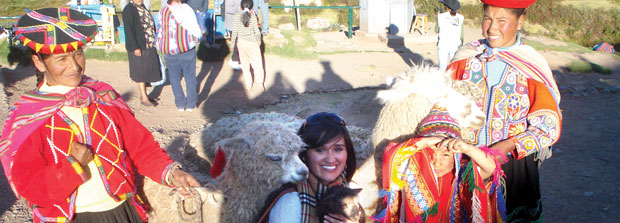 Though culturally important, preserving the historic site is not high on a list of
priorities for the locals of the valley.
Though culturally important, preserving the historic site is not high on a list of
priorities for the locals of the valley.
Even those who understand the ecological impact do not have the resources to do much about it. More than half of Peru’s population is considered impoverished, and the sense of tradition is strong, says Paredes, a native Peruvian from the Urubamba area and a first-generation immigrant raised in Northern California. Like Timchenko, she lived with a local family with the means to support an extra person in their household. “Often we would just sit in the plaza and watch people during the weekends. Thirty-five years ago my mother was there doing the same thing.”
Paredes, who researches immigration policy, used her native Spanish to speak with local governments about some of the changes that should be made. To kick-start the process, she focused on the young, who could in turn teach their parents. “I helped start an environmental education curriculum in the schools and tried to make students more aware of how their behavior has ramifications,” she says. “They would raise their little hands when we would ask, ‘how do you conserve water?’ And they would say, ‘walk instead of take a taxi.’ The kids knew the ideas but not how to apply them.”
In the small town of Pongobamba, near Cuzco, Peru, Paredes and Timchenko interacted with students, like fifth grader Jorge, seen here playing a Zampolla flute as part of an interactive project. Says Paredes, “We discussed composting, and talked a lot about positively influencing adults about conservation and respect for the environment.”
She also researched living standards in rural Peru from water pollution to trash collection. Paredes then translated that knowledge into hands-on activities for elementary school-aged children, who jumped at the opportunity to engage with their surroundings. “We coordinated with the five or six schools in the city to do posters and a clean-up day,” she says. “They took the leadership role in cleaning up a two- or three-block area surrounding the school.”
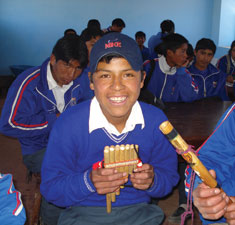 Her goal was to connect in their minds that local action can have global consequences.
Cuzco’s water supply comes from a visible glacier that traps the rain and channels
it towards the city via a stream. Environmentalists fear that global warming could
melt the glacier. Says Paredes, “Once this glacier as their main water supply dries
up they will no longer have any water. The projections are that this will happen in
the next decade.”
Her goal was to connect in their minds that local action can have global consequences.
Cuzco’s water supply comes from a visible glacier that traps the rain and channels
it towards the city via a stream. Environmentalists fear that global warming could
melt the glacier. Says Paredes, “Once this glacier as their main water supply dries
up they will no longer have any water. The projections are that this will happen in
the next decade.”
The need for water usage awareness is not limited to the West, she adds. Rural communities may not have access to running water, but they have plenty of access to communal water, which is more likely to spread disease. It is not dissimilar from the direct impact on their community that is made by traditional stoves. Timchenko explains, “A lot of times when indoor air quality is poor there is a lower birth rate among families and a higher rate of miscarriage.”
Less proficient in Spanish than Paredes, Timchenko was more involved in data collection
and analysis during their time in Peru. He researched statistics such as height, weight,
eye color, and other indicators like breath to determine whether the individual had
sustained substantial lung damage from long-term use of traditional stoves. The project
is ongoing, and Timchenko is awaiting statistics from current field volunteers to
see how the stoves have impacted people one year later. With 2,000 cleaner burning
stoves in place and more on the way, “I can already see an impact based from anecdotal
evidence of people being much happier with their stoves,” he says. For example, “people
have talked about how they’ve been less prone to getting an injury because the stove
fire was more contained.”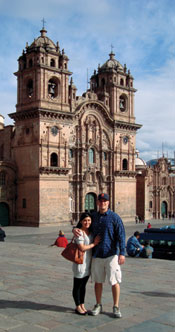
Claudia Paredes and Josef Timchenko
The ability to reach into the hearts and homes of the population plays a significant part in the success of operations like ProPeru. Paredes campaigned for rural communities not only at schools, but also at the local government level, working with the mayor’s office in Cuzco to establish citywide environmental programs. She learned that poor communities have a particular weapon at their disposal in the fight against environmental damage: unity.
“When one person has to harvest their crops everyone in the community will help,” explains Timchenko. “They will switch off to work together. A lot of the people are farming potatoes, and it’s amazing how, on breaks, they hang out eating potatoes together. They are truly ready to give you anything they have, even if it’s just a potato.”
Without the benefits of electric ovens, trash-collecting companies that separate recyclables, and pricey hybrid vehicles—as Paredes points out, “obviously in this area they can’t just go out and buy a Prius”—it’s left to communities to maintain environmental standards, with education and innovative help from NGOs and public policy students. As Paredes and Timchenko learned, in a place where the past and present live side-by-side, it really does take a village to preserve the ancient and protect the future.
